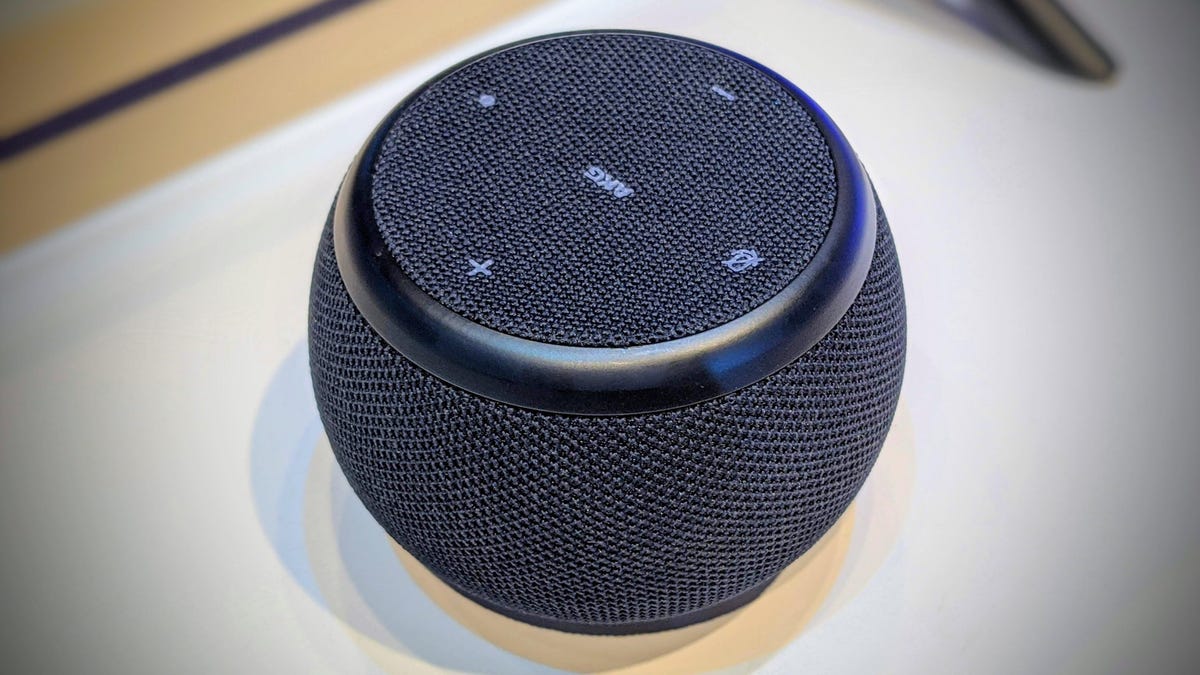Samsung could still best the Amazon Echo. Here's how
Commentary: The Galaxy Home Mini's late arrival to the smart speaker party might offer the dramatic entrance it needs to succeed.

The smart speaker market has exploded over the past half-decade, with first-party devices from Amazon, Google and Apple, as well as numerous third-party speakers employing Alexa and Google Assistant.
Then there's Samsung.
While Samsung's full-size Galaxy Home smart speaker announced back in February 2018 still has yet to materialize, it seems that the Mini version of the speaker might actually arrive soon. Photos and videos uncovered on Twitter in the run-up to today's Samsung Unpacked event show what appears to be a functioning Galaxy Home Mini speaker -- which houses Samsung's Siri equivalent, Bixby -- and a set of user instructions to go along with it. Samsung did not respond to a request for comment.
Many of the details, such as a hard release date and price, have yet to be announced, but the broader reality is clear: Samsung faces a difficult battle in challenging Amazon and Google, whose Alexa and Google Assistant voice assistants power the majority of the smart speakers in the US. This may still be a battle worth fighting, but the question is how well a Galaxy Home Mini speaker might fare against its more established competition.
Samsung's original Galaxy Home speaker was never released.
Is that really such a good idea, Samsung?
We've known about Samsung's ambitions for its own smart speaker since 2018, with a tease in February of that year leading up to a full unveiling of the cauldron-shaped Galaxy Home later that August. While the Galaxy Home never came to market, we've also known about the smaller Galaxy Home Mini for a while now, thanks to its beta test in Korea last year. When that model would reach a wider audience has remained unclear, but after this weekend's most recent story, it appears that the Home Mini may go on sale soon.
Bixby, the voice assistant powering the speaker's smarts, has been around even longer, as a not-so-competitive competitor to Siri and Google Assistant on Samsung's phones. Despite the small size of Bixby's user base, Samsung has continued to support and develop the assistant.
A long-unreleased speaker and an unpopular voice assistant don't combine to make the most appetizing tech confection, but I wouldn't write off Samsung's Galaxy Home speaker line just yet.
Smart speakers have been proliferating rapidly in households around the world, with Amazon bragging that it doubled its overall Alexa-powered device footprint in 2019, to a total of 200 millions units sold worldwide. Despite that rapid growth, the category is still in early days compared to many other types of personal devices like phones and laptops. Many people haven't adopted the technology yet, and that means a few companies are scrambling to stake claims in those untapped households. Budget speakers, such as Amazon's Echo Dot and Google's Nest Mini, allow for a cheap and easy means to try out this still maturing category.
Apple's HomePod released in 2018 with high quality sound and a $349 price tag.
Even Apple, which released its $349 HomePod in early 2018 and failed to capture much market share, might be getting in on the budget speaker game. A low-cost entry model seems like the key to spreading the technology at this stage.
So the Galaxy Home Mini is poised to enter a promising but turbulent market: one with a dominant Amazon, a competitive Google and a moneyed Apple. Where does that leave Samsung?
On the power of Bixby alone, the Korean company seems unlikely to stake a large claim in the US. But there could be another way.
The power of us
At the same time tech giants are trying to convert households, many people are cautious about buying into ecosystems so early in their development. Tech giants like Google, after all, are notorious for killing off devices and integrations within years of selling them.
Amazon says it has sold over 200 million Alexa devices.
How do developers offer products that feel low-risk, while still offering all the expected smarts? Sonos, a speaker company, has done it by offering Google Assistant and Alexa support in the same device. But the Sonos One costs $200. If the Galaxy Home Mini can reach the $50 price tag of an Echo Dot or Nest Mini, with the voice assistance of all three, Samsung's late arrival to the smart home party might end up a lucrative, dramatic entrance.
The possibility of such integration is unlikely, but not impossible. According to Blake Kozak, a smart home analyst at the market analytics firm IHS Markit, "It remains entirely possibly that the Galaxy Home Mini will support not only Bixby but also Alexa and Google Assistant ... Due to the growing emphasis on the SmartThings platform, it is likely that Bixby will continue to be used for platform-based controls, while it could punt more advanced features and functions to Alexa or Google Assistant."
Some of Samsung's recent entertainment devices, too, have boasted voice controls from Alexa, Google Assistant and Bixby -- all in one package. For Samsung, continuing this approach could convert voice-assistant agnostics, luring them in with Google Assistant and Alexa, then winning them over in the long term with Bixby.
Perhaps more to the point: If Samsung can't differentiate itself from the competition (even by welcoming other assistants into its speaker), it risks a repeat of Bixby's tepid reception. We shouldn't write off Bixby and the Galaxy Home Mini just yet, but Samsung still must earn its spot in a market with vast potential and even more competition.

